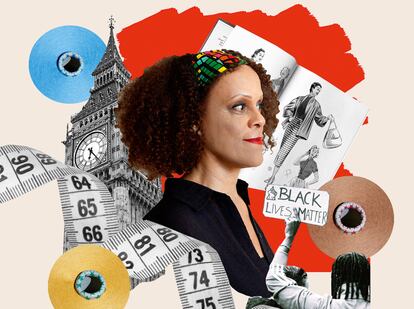Bernardine Evaristo: ‘It was hard to grow up where there was so much racism’
The writer was raised in a mixed family in London. She quit the theater at the age of 30 to write and she won the Booker Prize at 60, and now she recounts her life in ‘Manifesto: On Never Giving Up’

Bernardine Evaristo, 63, vividly remembers her first ever visit to Spain. “It was in 1988, I spent a year traveling around Europe with a friend and we ended up in Fuengirola, we were looking for some sun. I’m English, we really like coming to the Canary Islands and the Costa del Sol,” she says laughing. The author is back in Madrid to discuss her memoirs, Manifesto: On Never Giving Up. She says her book is not a typical autobiography, but “a book about creativity, how to lead a creative life on your own terms.”
The idea originated in 2019, when she scooped the Booker Prize for Girl, Woman, Other, awarded jointly for the first time in the history to Evaristo’s novel and The Testaments by the Canadian writer Margaret Atwood. “I have literally now given hundreds and hundreds of interviews and talked about myself a lot. That’s why, the next step for me as a writer was to let people know who I was, to fill in the gaps, because a lot of people were being introduced to me because of the prize, they didn’t know who I was, although I have been around for 40 years and my first book was published in 1996,” she explains. Certain spaces had yet to be filled. “Most memoirs were traditionally written by men, famous men. So, I think it’s really important that women’s stories get out there and we need more memoirs, autobiographies, biographies, more women writing books,” she says. In 2022, Annie Ernaux’s autobiography won the Nobel Prize, and authors who explore their lives, such as Mary Karr or Vivian Gornick, are now highly acclaimed.
As a child, she says, she felt she lacked role models, and she turned to reading as a refuge, discovering authors like Audre Lorde. “In the 1980s, she wrote a book, an autobiography called Zami: A New Spelling of My Name, and it was extraordinary because that was 40 years ago when she was writing about her life and she was a Black lesbian and a poet, and it was very inspiring for me as a young woman to read that,” she explains.
Evaristo was raised along with her seven siblings — a mixed family of a white English mother of Irish descent and a Nigerian father of Brazilian-African descent — in a white neighborhood of London. “I wanted people to know how hard it was to grow up in a household where there was so much racism in a society that there was so much disapproval of your parents’ marriage. But I’ve used it in a positive way and it’s made me stronger,” she points out.
She takes a look back at the past to see how far society has advanced, where she has come from: “When I was young, racism was legal, sexism was legal. When you have no legislation against bigotry and discrimination, people can do what they like and say what they like and get away with it. That world that I was born into 63 years ago was a very different world to the world today.” She believes that the Black Lives Matter movement “really shook the foundations of British culture, because the institutions really started looking at themselves, at their systemic racism.” However, the issue is far from resolved: “We’ve had the Tory government for 12 years now and one of the things the government never acknowledges is systemic racism. They deny it, even if they’re brown themselves, like our prime minister, Rishi Sunak, or home secretary, Suella Braverman. So, There was a backlash against looking critically at British history and people were accused of being unpatriotic. I can’t believe it.”
The process of exploring her origins to write her memoirs has helped her to understand her own creative approach. She left home early, she needed a room of her own, to no longer have to share with one of her sisters. “I painted the walls bright red because I could, and there was nobody to stop me. But I felt I could be myself,” she recalls. This was the first step in the fight against the establishment that has shaped her life. “You have these milestones that society says you’re supposed to achieve at certain ages as a woman. But life throws lots of curveballs at you. Life is unpredictable. And for some people, what’s established doesn’t work. At the age of 20, I studied Dramatic Art and turned to theater; when I was 30 I decided to become a writer; I met my long life partner, David, in my forties; I got my first proper full time job at a university when I was 51; I bought my own home for the first time at 55; and then I won the Booker Prize at 60. People ask me if it wouldn’t have been better to win it when I was younger and I say no, because I could’ve got lost within myself. Whereas at the age of 60, I was very established in who I am, I know who my friends are and what my creativity is. I know what I believe in. I can actually just enjoy the moment and exploit it.”
In Manifesto, she deplores this ageism, which she perceives as palpable in literature and the audiovisual industry. “We live in a patriarchal society where young women are judged according to how they look, and the stories of older women are not told. It’s shocking. It’s shocking that the fashion industry is still focusing on the thinnest women imaginable to sell clothes when 99.9% of women do not look like that, it doesn’t make sense. It is all part of a patriarchal society. And that needs to change,” she explains.
Evaristo believes that one of the ways to define her personality was by making her own clothes: “It was a statement to the world of who I was and what my identity was. When I was a child, I wanted to be like everybody else, but by the time I was 13 or 14, I wanted to stand out, and I was reacting against not being accepted by deciding that I didn’t want to be like everybody else.” As a result of going against the tide, many of the lessons that she recounts in her memoirs have emerged, where she opens up and, in addition to celebrating her achievements, reflects on dark moments, such as her relationship with a woman she calls the Mental Dominatrix. “I had a really toxic relationship with the Mental Dominatrix, which took a long time for me to overcome, I hope it serves as a warning not to be with people like that. You have to get away from what is detrimental to you and to your creative process.”
Sign up for our weekly newsletter to get more English-language news coverage from EL PAÍS USA Edition
Tu suscripción se está usando en otro dispositivo
¿Quieres añadir otro usuario a tu suscripción?
Si continúas leyendo en este dispositivo, no se podrá leer en el otro.
FlechaTu suscripción se está usando en otro dispositivo y solo puedes acceder a EL PAÍS desde un dispositivo a la vez.
Si quieres compartir tu cuenta, cambia tu suscripción a la modalidad Premium, así podrás añadir otro usuario. Cada uno accederá con su propia cuenta de email, lo que os permitirá personalizar vuestra experiencia en EL PAÍS.
¿Tienes una suscripción de empresa? Accede aquí para contratar más cuentas.
En el caso de no saber quién está usando tu cuenta, te recomendamos cambiar tu contraseña aquí.
Si decides continuar compartiendo tu cuenta, este mensaje se mostrará en tu dispositivo y en el de la otra persona que está usando tu cuenta de forma indefinida, afectando a tu experiencia de lectura. Puedes consultar aquí los términos y condiciones de la suscripción digital.









































